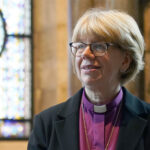(RNS) — It is a weekend morning in the United States and the library doors are open. A young family searches for new picture books for bedtime. An older couple arrives for their tax help appointment. A teenager slips in to use the Wi-Fi before work. Just a few blocks away, a house of worship fills with voices in prayer, volunteers gather to feed the hungry or elders tutor neighborhood children.
Different buildings, yet both carry a similar spirit of welcome, fellowship and service.
Libraries and houses of worship are trusted establishments in our communities. Both are places people turn to for comfort, knowledge and connection. Each provides a unique approach to nurturing the spirit and tending to the daily flourishing of minds and lives, telling stories that speak to the deepest part of the human experience.
RELATED: My book was just banned from the US Naval Academy library
Unfortunately, libraries are sometimes portrayed as at odds with people of faith. This often stems from a lack of information or understanding of the policies and the mission of libraries. So many people of faith in our country use and benefit from libraries, treasuring them as shared communal spaces where diverse belief systems, traditions and identities can flourish and interact. They are places where everyone’s sacred books are welcome and where all books and perspectives are treated as equally sacred.
This week is “Banned Books Week” across the country, when we raise awareness about the dangers of censorship and celebrate the freedom to read. We, the authors, are a librarian who is a person of deep faith, and a religious leader whose family loves our local library. It pains us to acknowledge the threat that our libraries currently face. There is a small minority who wield their faith as a justification to target libraries for censorship, insisting they have the right to tell the rest of us what morality looks like or which stories matter. This is bad for libraries, bad for democracy and bad for faith.
The work of protecting libraries, confronting book bans and defeating censorship is aligned with so many faith communities’ dedication to truth, compassion and justice. The protection of libraries and the stories they hold should be understood as a wider commitment of our communities to religious freedom. All too often, stories about Jews, Muslims or other religious minorities are targeted by censorship efforts aimed at erasing the diversity at the heart of our democracy.

(Photo by Tom Hermans/Unsplash/Creative Commons)
That is why people of faith belong firmly and proudly on the front lines of advocating for local libraries — and contesting efforts to undermine or censor them. Religious communities dedicated to a thriving multifaith democracy can and should uplift libraries and what they represent — a belief in everyone’s shared dignity and right to learn.
Public libraries in America could be described as secular sanctuaries. They have in common not only architecture built for light, reflection and gathering, but their enduring spirit of welcome and wonder. From their beginnings, library leaders saw librarianship as a civic calling, a ministry of service that strengthens communities by ensuring access to knowledge, opportunity and culture.
That calling is enshrined in the Library Bill of Rights, which affirms that every person deserves access to information, regardless of belief, class or background. In any given week, library meeting rooms may host a Buddhist meditation circle, a lecture on transhumanism, a tenants’ rights organizing session, a youth poetry slam and an amateur astronomy club without judgment, exclusion or restriction. These resources weave together the fabric of community life. That fabric frays when both sacred texts and books questioning faith are silenced.
To stave off the threat of censorship, we encourage local librarians and supporters of the library to reach out to nearby faith communities, listen to their ideas and build new coalitions dedicated to serving all in the community. For access to knowledge to remain real and meaningful, library policies and procedures must be carried out through good-faith collaboration with each other. Libraries need every voice — religious and secular, artistic and scientific, young and old — to sing in chorus for the freedom to read.
Religious leaders and followers can and must show up alongside library workers to defend the freedom to read, the freedom to think, the freedom to grow and the freedom of faith. Every voice that joins this choir strengthens the promise that libraries remain open, welcoming and empowering to everyone.
(The Rev. Paul Brandeis Raushenbush is the president and CEO of Interfaith Alliance. Sam Helmick is the 2025-2026 president of the American Library Association. The views expressed in this commentary do not necessarily reflect those of Religion News Service.)



